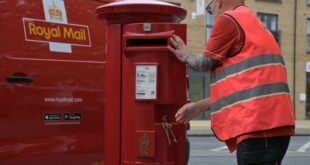The public face new taxes to receive certain goods and gifts from EU countries after the Brexit transition period expires at the end of the year.
The UK government, Royal Mail and the Post Office have issued guidance to consumers about extra tax and paperwork requirements for sending and receiving goods.
Anyone receiving a gift worth more than £39 ($52.61) may face a bill for import VAT, and for customs duty on goods or gifts worth more than £135 if it has not been paid by the sender.
The changes reflect Britain’s decision to leave the EU’s customs union, which sees member states charge no import taxes on each other’s goods. The move allows more freedom to negotiate trade agreements and protect UK industries in future, at the price of new barriers and taxes on trade with the EU, still Britain’s biggest trading partner.
“For gifts over £39 and goods over £135, Royal Mail may collect the VAT and customs duties on behalf of HM Revenue & Customs (HMRC). from the recipient prior to delivery,” according to Royal Mail’s website.
It said letters, postcards and documents are “usually” exempt.
WATCH: Brexit makes UK-EU economic relationship ‘harder’
UK government guidance published last week added: “Royal Mail will tell you how much you need to pay and the available payment methods. Once payment is received, you can request delivery of your package or pick it up from your local delivery office or depot.”
Meanwhile individuals returning from the EU and carrying goods themselves also face new customs duty fees on products worth £390 or more. The rate is charged at 2.5% of the item’s full value on goods up to £630, and at varied rates depending on the kind of goods above £630.
Used goods are liable to the same duty and VAT charges, though HMRC says this “may vary depending on their age and condition.”
Currently anyone arriving in the UK from the EU currently pays no taxes on goods they are carrying, as long as they are for personal or gift use and any relevant taxes have been in the country they are arriving from.
Meanwhile the Post Office is warning customers they face new hurdles to send goods and gifts to the EU.
READ MORE: Banking stocks plunge as finance misses out in Brexit deal
“Customers posting from England, Scotland and Wales will be required to attach customs declaration forms to all items containing gifts or goods being sent abroad, including to EU destinations,” according to its website. But the rules do not apply to customers posting from Northern Ireland.
Different customs labels have to be filled out for goods depending on whether they are worth £270 or more, either in advance by printing them out or in Post Office branches. Parcelforce also requires a different form available in Post Office branches.
The Post Office notes the sender is “legally responsible” for the information so urges customers to ensure it is accurate.
The extra paperwork is one of many new administrative barriers to trade with the EU as Britain moves away from the bloc.
“Customs, rules of origin and regulatory checks will require the appropriate paperwork to be produced at the border, which will almost certainly mean disruptions especially in the early days of 2021,” wrote Nomura analysts in a note on Tuesday.
“Tariff- and quota-free goods trade may have been preserved, but frictionless trade has not.”
Source link



